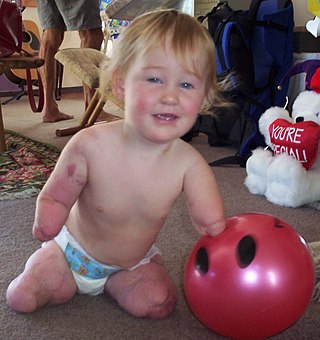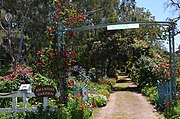
Vaccine hesitancy is a delay in acceptance, or refusal, of vaccines despite the availability of vaccine services and supporting evidence. The term covers refusals to vaccinate, delaying vaccines, accepting vaccines but remaining uncertain about their use, or using certain vaccines but not others. The scientific consensus that vaccines are generally safe and effective is overwhelming. Vaccine hesitancy often results in disease outbreaks and deaths from vaccine-preventable diseases. Therefore, the World Health Organization characterizes vaccine hesitancy as one of the top ten global health threats.

Tharunka is a student magazine published at the University of New South Wales in Sydney, Australia. Established in 1953 at the then New South Wales University of Technology, Tharunka has been published in a variety of forms by various student organisations. At present, Tharunka is published 8 times a year by Arc @ UNSW Limited. The name Tharunka means "message stick" in a Central Australian Aboriginal language.

Meningococcal disease describes infections caused by the bacterium Neisseria meningitidis. It has a high mortality rate if untreated but is vaccine-preventable. While best known as a cause of meningitis, it can also result in sepsis, which is an even more damaging and dangerous condition. Meningitis and meningococcemia are major causes of illness, death, and disability in both developed and under-developed countries.

The Sydney International Regatta Centre (SIRC), located in Penrith, Sydney, New South Wales, Australia, is a rowing and canoe sprint venue built for the 2000 Summer Olympics. It is now a popular sporting venue, with the Head of the River Regatta held annually.

Charlotte Lucy Cleverley-Bisman is a New Zealander known as the face of a New Zealand campaign to encourage vaccination against meningococcal disease after contracting and surviving severe meningococcal sepsis. She was nicknamed "Miraculous Baby Charlotte" by her fellow New Zealanders as a result of making headlines worldwide after recuperating from a series of life-threatening complications. She is the daughter of Pam Cleverley and Perry Bisman.
A vaccination policy is a health policy adopted in order to prevent the spread of infectious disease. These policies are generally put into place by State or local governments, but may also be set by private facilities, such as workplaces or schools. Many policies have been developed and implemented since vaccines were first made widely available.
Vaccinate Your Family (VYF), formerly known as Every Child By Two (ECBT), is a non-profit organization, based in the United States, which advocates for vaccinations. Founded in 1991, its stated goals are to "raise awareness of the critical need for timely immunizations and to foster a systematic way to immunize all of America's children by age two." ECBT was founded by former First Lady of the United States Rosalynn Carter and former First Lady of Arkansas Betty Bumpers. ECBT was renamed to Vaccinate Your Family in 2018.
NmVac4-A/C/Y/W-135 is the commercial name of the polysaccharide vaccine against the bacterium that causes meningococcal meningitis. The product, by JN-International Medical Corporation, is designed and formulated to be used in developing countries for protecting populations during meningitis disease epidemics.
Meningococcal vaccine refers to any vaccine used to prevent infection by Neisseria meningitidis. Different versions are effective against some or all of the following types of meningococcus: A, B, C, W-135, and Y. The vaccines are between 85 and 100% effective for at least two years. They result in a decrease in meningitis and sepsis among populations where they are widely used. They are given either by injection into a muscle or just under the skin.
The Australian Vaccination-risks Network Inc., formerly known as the Australian Vaccination-Skeptics Network (AVsN), and before that known as the Australian Vaccination Network (AVN), is an Australian anti-vaccination pressure group registered in New South Wales. As Australia's most controversial anti-vaccination organisation, it has lobbied against a variety of vaccination-related programs, downplayed the danger of childhood diseases such as measles and pertussis, championed the cause of alleged vaccination victims, and promoted the use of ineffective alternatives such as homeopathy.
MenAfriVac is a vaccine developed for use in sub-Saharan Africa for children and adults between 9 months and 29 years of age against meningococcal bacterium Neisseria meningitidis group A. The vaccine costs less than US$0.50 per dose.
Marty Mayberry is a double leg amputee LW3 classified Paralympic alpine skier from Australia. Mayberry lost both legs after contracting meningococcal disease when he was sixteen years old. This experiences led him to study medicine, and he attended Griffith University and the University of Sydney where Mayberry pursued health science courses. Beyond the classroom, he has written a paper on meningococcal disease, worked part-time on research about the disease, and talked about his experiences at a conference.

The Oxford Vaccine Group (OVG) is a vaccine research group within the Department of Paediatrics at the University of Oxford. It was founded in 1994 by Professor E. Richard Moxon, was initially based at the John Radcliffe Hospital, and moved in 2003 to its current location in the Centre for Clinical Vaccinology and Tropical Medicine (CCVTM) at the Churchill Hospital in Oxford, England. The group, led by Professor Andrew Pollard since 2001, comprises around 75 members across a number of disciplines, including consultants in paediatrics and vaccinology, clinical research fellows, research nurses, statisticians, post-doctoral laboratory scientists, research assistants and DPhil students.

Measles is extremely contagious, but surviving the infection results in lifelong immunity, so its continued circulation in a community depends on the generation of susceptible hosts by birth of children. In communities which generate insufficient new hosts the disease will die out. This concept was first recognized by Bartlett in 1957, who referred to the minimum number supporting measles as the critical community size (CCS). Analysis of outbreaks in island communities suggested that the CCS for measles is c. 250,000. Due to the development of vaccination against measles, the world has seen a 99% decrease in measles related cases compared cases before the vaccine was developed.

Dorit Rubinstein Reiss is a Professor of Law and the James Edgar Hervey '50 Chair of Litigation at UC Hastings College of Law. She has also worked for the Hebrew University of Jerusalem and the Israeli Ministry of Justice's Department of Public Law.

The 2019 Samoa measles outbreak began in September 2019. As of 6 January 2020, there were over 5,700 cases of measles and 83 deaths, out of a Samoan population of 200,874. Over three percent of the population were infected. The cause of the outbreak was attributed to decreased vaccination rates, from 74% in 2017 to 31–34% in 2018, even though nearby islands had rates near 99%.

The Australian National Immunisation Program Schedule sets out the immunisations Australians are given at different stages in their life. The program aims to reduce the number of preventable disease cases in Australia by increasing national immunisation coverage. The program starts for an Australian when they are born. Vaccinations are given at birth, then again when the baby is 2 months, 4 months, 6 months, 12 months and 18 months. The immunisation schedule continues when the child is 4 years old, and then into adolescent years. The program is not compulsory and parents have the choice if they want their child vaccinated.
Helen Aspasia Petousis-Harris is a New Zealand vaccinologist and associate professor in the Department of General Practice and Primary Health Care at the University of Auckland. She has been involved in research related to vaccination in New Zealand since 1998, with her main areas of focus being vaccine safety and effectiveness. Petousis-Harris has had a variety of lead roles in New Zealand and international organisations that focus on vaccination and is a regular media spokesperson in this field, especially during the COVID-19 pandemic.
Vaccination requirements for international travel are the aspect of vaccination policy that concerns the movement of people across borders. Countries around the world require travellers departing to other countries, or arriving from other countries, to be vaccinated against certain infectious diseases in order to prevent epidemics. At border checks, these travellers are required to show proof of vaccination against specific diseases; the most widely used vaccination record is the International Certificate of Vaccination or Prophylaxis. Some countries require information about a passenger's vaccination status in a passenger locator form.
Helen Siobhan Marshall is an Australian medical researcher who is Professor of Vaccinology at the University of Adelaide. She was named the South Australian of the Year for 2022.














